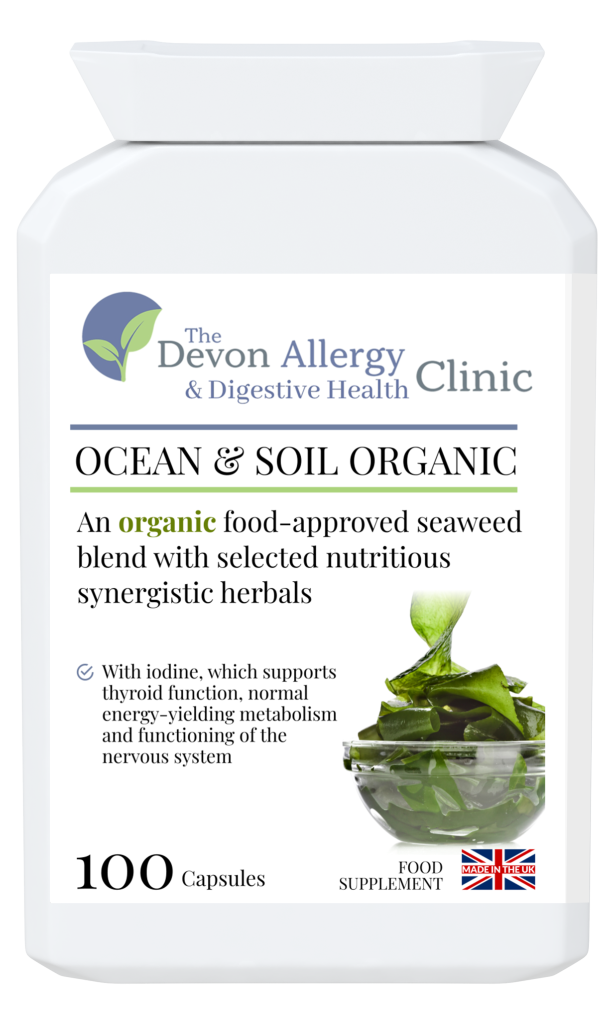Ocean & Soil Organics
£18.98
Description
An organic seaweed, vegetable and herbal formula, which combines the best of what the sea and Earth’s soil have to offer.
This Soil Association organic food supplement offers a unique blend of iodine-rich, food-approved seaweeds (Ascophyllum nodosum and Fucus vesiculosus), with a range of vegetables and herbs: artichoke, chlorella, green tea leaf, spirulina, ashwagandha root and cayenne.
More information:
Seaweed, vegetable and herbal combination
Soil Association and EU organic
Iodine rich
With organic ashwagandha root
Support for your thyroid function
Support for your energy levels
Support for your nervous system
Support for your skin
Support for your cognitive function
Support for the normal growth of children
Dairy-free and gluten-free
Kosher approved
Suitable for vegetarians and vegans
About the ingredients:
About the organic Seagreens® food-approved seaweed
Ascophyllum nodosum
This is a large, common brown alga (Phaeophyceae) in the family Fucaceae, being the only species in the genus Ascophyllum. It is seaweed of the northern Atlantic Ocean, and is also known as rockweed, Norwegian kelp, knotted kelp, knotted wrack or egg wrack. It is common on the north-western coast of Europe (from Svalbard to Portugal) including east Greenland and the north-eastern coast of North America. Seagreens® Ascophyllum nodosum is sourced from the Scottish Outer Hebrides and is the highest of Seagreens’® species in terms of iodine levels – typically 700mcg iodine per 1g.
Ascophyllum nodosum contains both macro-nutrients (e.g. nitrogen, phosphorus, potassium, calcium, magnesium, sulphur) and micro-nutrients (e.g. manganese, copper, iron, zinc etc). It is also a source of cytokinins, auxin-like gibberellins, betaines, mannitol, organic acids, polysaccharides, amino acids and proteins.
Fucus vesiculosus
Known by the common name bladder wrack or bladderwrack, Fucus vesiculosus is a seaweed found on the coasts of the North Sea, the western Baltic Sea and the Atlantic and Pacific Oceans. It also known by the common names black tang, rockweed, bladder fucus, sea oak, black tany, cut weed, dyers fucus, red fucus and rock wrack.
It contains mucilage, algin, mannitol, beta-carotene, zeaxanthin, bromine, potassium, volatile oils, iodine and other minerals. It was actually the original source of iodine, discovered in 1811.
Overall, seaweeds form an essential source of natural iodine and are described as an ideal food-safe natural source of this important mineral.
Iodine in seaweeds
Iodine in seaweeds contributes to:
- the normal growth of children
- normal cognitive function
- normal energy-yielding metabolism
- normal functioning of the nervous system
- the maintenance of normal skin
- the normal production of thyroid hormones and normal thyroid function.
Click here, here and here for EFSA scientific opinions.
The iodine also has the added benefit of being sourced from seaweed that naturally contains all of the other minerals and micronutrients needed for its proper transport and metabolism (including selenium, tyrosine, zinc, copper, vitamins A, B2, B3, B6 and C).
As most iodine is from dairy and meat, this is ideal for vegan, vegetarian, allergy and intolerance diets.
About the other sea ingredients
Spirulina
Spirulina is a blue-green microalgae. It contains between 55 and 70% protein, 8 essential and 10 non-essential amino acids, as well as gamma-linolenic acid (GLA), beta-carotene, linoleic acid, arachidonic acid, vitamin K, pantothenic acid, magnesium, potassium, thiamin, riboflavin, niacin, iron, copper, manganese, nucleic acids RNA and DNA, chlorophyll and phycocyanin (a pigment-protein complex that is found only in blue-green algae).
Chlorella
An edible, single-cell marine algae (a sea-moss or sea lettuce), chlorella contains chlorophyll, vitamin B12, beta-carotene, polyunsaturated fatty acids and 19 amino acids (including the 8 essential amino acids). It is also a source of calcium, iron, selenium and zinc.
About the soil ingredients
Artichoke
Two of the phtyonutrients found in artichoke (the close botanical cousin of the herb milk thistle) are cynarin and silymarin. Artichokes also contain dietary fibre, potassium, vitamin C, folate and magnesium.
Green tea
Camellia thea, or green tea, is a source of catechin polyphenols – Epigallocatechin gallate (EGCG), in particular.
Ashwagandha root
Belonging to the same family as the tomato, ashwagandha is a plump shrub with oval leaves and yellow flowers. It bears red fruit about the size of a raisin. The herb is native to the dry regions of India, northern Africa, and the Middle East, and today is also grown in more mild climates, including the United States.
Cayenne
Fiercely hot and pungent, cayenne, also known as cayenne pepper, is one of the most widely used spice ingredients for culinary purposes. Cayenne fruits are slender, elongated pods derived from the capsicum family plant (a cultivar of Capsicum annuum related to bell peppers, jalapeños, paprika, and others). Cayenne contains vitamin A, vitamin B6, vitamin E, vitamin C, riboflavin, potassium and manganese. It is also a source of capsaicin.
Additional information
| INGREDIENTS | Each proprietary blend capsule provides: %NRV* Iodine (from the organic seaweed) – 192mcg 128% *NRV = Nutrient Reference Value Also provides: Organic seaweed – 300mg Other ingredients – 290mg Ingredients: *Seaweed Ascophyllum Nodosum, Hydroxy-Propyl-Methylcellulose (HPMC) Capsule Shell, *Seaweed Fucus Vesiculosus, *Spirulina, *Artichoke, *Chlorella, *Green Tea Leaf, *Ashwagandha Root powder, *Cayenne Key: * = Certified organic ingredients. NO fillers, additives or binders. The herbs used in this food product are grown to the highest organic standards. Suitable for vegetarians and vegans. |
|---|---|
| USAGE | 1 or 2 capsules to be taken 1 to 3 times per day, or as advised. |

